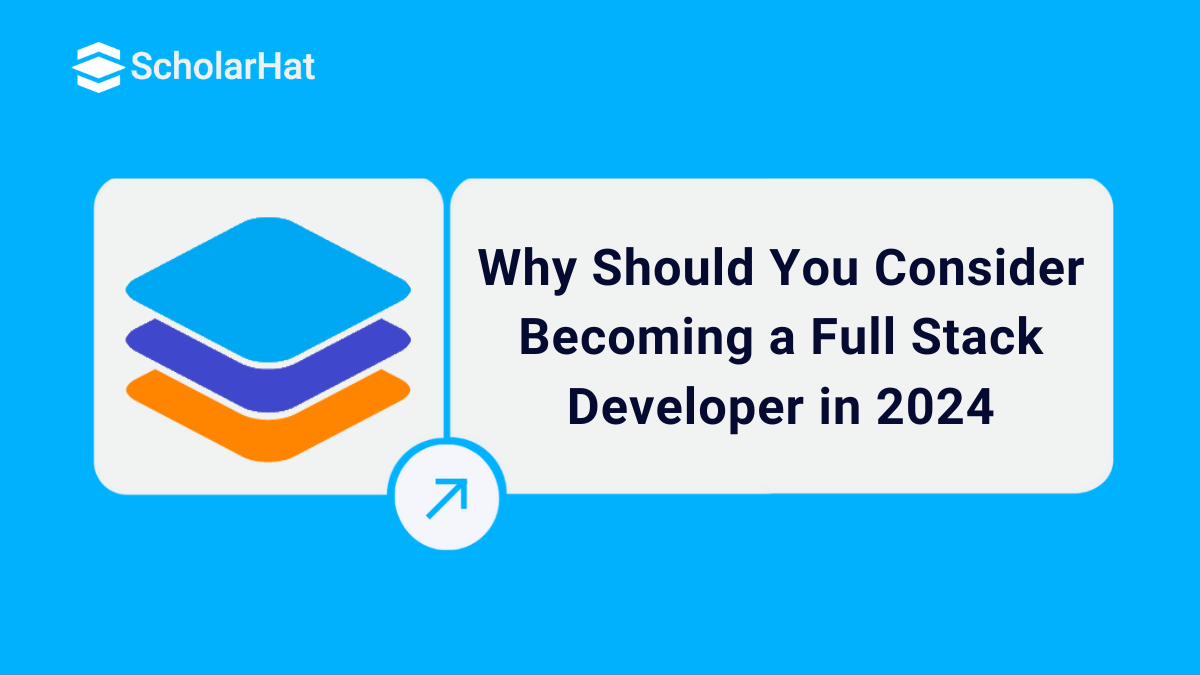27
jul.Why Should You Consider Becoming a Full Stack Developer in 2024
Introduction to Full Stack Development
The technology landscape is constantly evolving, with new tools, frameworks, and languages emerging almost daily. In this dynamic environment, the role of a full-stack developer has become more crucial than ever. Full-stack developers are proficient in both front-end and back-end languages, understanding how to manage databases, servers, system engineering, and clients.
Becoming a full-stack developer in 2024 offers numerous advantages, including high demand, competitive salaries, and diverse job opportunities across various industries.
Read More: Full Stack Developer Roadmap - A Beginner Guide [2024]
Understanding the Role of a Full-Stack Developer
Who is a Full Stack Developer?
A full-stack developer is a professional proficient in both; front-end and back-end development. They possess skills in programming languages, frameworks, and technologies used for building user interfaces, server-side logic, and databases.
Full-stack developers are capable of working on all aspects of a web application, from designing and implementing user interfaces to managing server infrastructure.
Read More: Who is a Full Stack Developer?
Enhance your full-stack skills with ScholarHat’s following certification programs:
- Full-Stack .NET Developer Certification Training
- MERN: Full-Stack Web Developer Certification Training
- Advanced Full-Stack .NET Developer Certification Training
Key Responsibilities
The responsibilities of a full-stack developer include:
- Designing and implementing user interfaces for web applications.
- Developing back-end server logic and databases.
- Ensuring cross-platform compatibility and responsive design.
- Integrating third-party APIs and services.
- Testing and debugging applications for functionality and performance.
- Implementing security measures to protect against cyber threats.
- Collaborating with team members on project planning and execution.
- Staying updated on emerging technologies and industry trends.
- Optimizing application performance and scalability.
- Providing technical support and troubleshooting issues.
- Documenting code and maintaining project documentation.
- Contributing to continuous improvement and code reviews.
Managing such a broad range of technologies necessitates a versatile skill set, which is why the role is highly revered in the tech industry.
The Benefits of Becoming a Full-Stack Developer
- Versatility in handling both front-end and back-end development tasks.
- Ability to develop entire applications independently, streamlining development processes.
- Broader career opportunities and higher earning potential in the tech industry.
- Enhanced problem-solving skills and understanding of the entire software stack.
- Flexibility to work on diverse projects and adapt to evolving technologies.
- Increased job satisfaction through involvement in all aspects of application development.
- Opportunities for entrepreneurship and freelance work with comprehensive skill sets.
- Stronger collaboration and communication skills by working across different development areas.
- Continuous learning and skill development in a dynamic and rewarding field.
- Satisfaction with creating tangible solutions and contributing to innovative projects.
Have a look at Full Stack Developer Salary
Essential Skills for Full Stack Developers in 2024
To be successful as a full-stack developer, certain skills are essential:
- Front-end technologies: Proficiency in HTML, CSS, and, JavaScript along with frameworks like AngularJS, React.js, or Vue.js.
- Back-end technologies: Experience with server-side languages such as Python, Ruby, Java, and Node.js.
- Database and cache: Familiarity with database storage solutions such as MySQL, MongoDB, Oracle, and SQL Server.
- Basic design ability: Understanding of layout aesthetics.
- Server management: Ability to manage a hosting environment, including database administration and scaling applications to handle load changes.
- Version control system (VCS): A strong understanding of Git to handle changes in the development project without losing previous work.
How to Become a Full-Stack Developer?
- Learn the Fundamentals: Begin by mastering the basics of web development, including HTML, CSS, and JavaScript. Understand how to create and style web pages.
- Gain Proficiency in Back-End Technologies: Learn a server-side programming language such as Python, Java, or JavaScript (Node.js). Familiarize yourself with frameworks like Django, Spring Boot, Laravel, or Express.js.
- Explore Databases: Understand how to work with databases, including relational databases like MySQL or PostgreSQL, as well as NoSQL databases like MongoDB.
- Understand APIs: Learn about RESTful and GraphQL APIs and how to interact with them using HTTP requests. Gain experience with API design principles and documentation.
- Practice Version Control: Learn to use version control systems like Git and GitHub for collaboration and code management.
- Explore Cloud Computing: Familiarize yourself with cloud platforms like AWS, Microsoft Azure, or Google Cloud Platform.
- Work on Projects: Build real-world projects to apply your skills and gain practical experience.
- Stay Updated: Keep up with industry trends, new technologies, and best practices by reading blogs, attending meetups, and participating in online communities.
- Continuous Learning: Full-stack development is a constantly evolving field, so commit to lifelong learning to stay relevant and advance your career.
The Future of Full Stack Development
The future of full-stack development is poised for innovation and evolution, fueled by emerging technologies and changing industry demands. As businesses increasingly prioritize digital transformation, full-stack developers will play a pivotal role in creating seamless and immersive user experiences across platforms.
With the integration of artificial intelligence, cloud computing, and edge computing, full-stack developers have the opportunity to build intelligent and scalable applications that anticipate user needs and adapt to dynamic environments.
Moreover, as the boundaries between front-end and back-end development blur, full-stack developers will embrace new paradigms and frameworks to deliver cutting-edge solutions that drive business growth and shape the digital landscape of tomorrow.
Conclusion
Choosing a career as a full-stack developer in 2024 is a smart decision. The blend of technical versatility, competitive salaries, and extensive job opportunities make it a lucrative and fulfilling path. As businesses continue to rely on technology for their operations, the need for skilled developers who understand both, the front and back ends of web development will continue to grow. Start your journey towards becoming a proficient full stack .Net developer today and be at the forefront of technology innovation.
Take our free skill tests to evaluate your skill!

In less than 5 minutes, with our skill test, you can identify your knowledge gaps and strengths.




